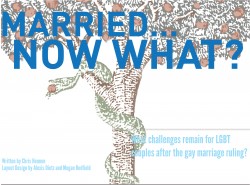News | August 6th, 2015

In June, when the US Supreme Court ruled that state bans on gay marriage were unconstitutional, thereby giving a victory to those challenging North Dakota’s ban, plaintiffs in the case were worried about how specific issues would be handled in the months ahead for same-sex couples in the state. A few of these include inheritance, joint filing of taxes, access to health care and insurances, hospital visiting privileges and child custody.Prior to FM Pride, HPR decided to take a look at how these issues have been handled since the ruling thus far. From those we talked to, the results are so far, so good. Despite some minor time delays, immediate issues, such as getting health insurance coverage for same-sex spouses and making same-sex spouses legal guardians of children of divorced parents, seem to be happening in equal fashion.Other issues, such as inheritance and joint filing of taxes, will take longer to review. Hospital visiting privileges were reported to be going well before the ban was overturned at least at hospitals in large North Dakota cities such as Fargo, in part according to ND State Representative Joshua Boschee (D-Fargo). This is due to an executive order President Obama issued in his first term that required hospitals that are receiving Medicare and Medicaid to allow access for same-sex couples.
Ron Ramsay, an NDSU architecture professor, was one of the plaintiffs in the case that challenged North Dakota’s same-sex marriage ban. Immediately after US District Judge Ralph Erickson declared North Dakota’s ban “unconstitutional and invalid” in the wake of the Supreme Court ruling, Ramsay requested health insurance coverage for his uninsured spouse (they were married before the suit) under his health insurance plan.
Because Ramsay was an employee of a state institution, the coverage needed to go through the state agency that oversees the plan, the North Dakota Public Employee’s Retirement Program, which negotiated with the insurance company, Sanford Insurance. It took a few weeks but ultimately Ramsay’s spouse was covered and the insurance was retroactive.
“I have insurance through NDSU but my husband was uninsured and now he is insured as any spouse would be through my policy. I pay a little extra per month to have him covered. Any married person has that option,” Ramsay told HPR. “It took a while, it wasn’t instantaneous and I suppose at that point, I was pretty frustrated and wondered why it wasn’t being instantaneous. But I see that it had to be negotiated with the insurer to be equitable, they made it retroactive to July 1 so that by mid-July, we were fully covered.”
Ramsay has also talked to couples who haven’t had any issues with child custody cases since the ruling. Rep. Boschee, the first openly gay legislator in North Dakota and a leader in the state on LGBT issues, has also heard that things have gone well since the ruling.
“I haven’t heard of anyone not being granted access to anything or not receiving services that they would expect of an opposite sex couple.I do know that in Ron Ramsay’s case, questions may come up and people might not have the answers right away,” Boschee said. “They have to do a little digging. But eventually it becomes the outcome of what the citizen was hoping for. Other than that, it sounds like things are going pretty smoothly.”
The only resistance to the ruling in North Dakota so far has come from two county recorders in Stark and Walsh County. They refused to issue gay marriage licenses because of personal religious objections. However, those two employees can authorize other employees who don’t have the same objections to issue the licenses.
“When we start getting into the situation of elected state officials who take an oath to the state constitution, picking and choosing who they serve, that creates a lot of problems for people not just LGBT North Dakotans but potentially people in different states,” Boschee said.
“We’ve had a lot of conversations about religious liberty. People who have different family makeups, people who have different races so where does it end as a far as an elected official who serves in the government and them being able to self-select who they work with and who they don’t? Right now it’s being handled at the individual county level but will be interested to see if the Attorney General has an opinion or what their office is doing to address the concerns that may be raised.”
While things have gone fairly smooth since the ruling in North Dakota, that is not the case in other states such as Alabama, Texas and Oklahoma where State Supreme Court Justices, Legislatures and Attorney Generals have decided to fight the ruling and have been ordering county officials not to issue gay marriage licenses. Plaintiff Ron Ramsay was a bit cautious immediately following the ruling about how it would be handled in North Dakota. But in a month and a half since, he can’t complain seeing what’s happening elsewhere across the US in those southern states.
“Working through the relative comfort of North Dakota. It’s interesting to watch how the struggle does go on in some places,” Ramsay said. “It’s unfortunate. I never assumed when the Supreme Court did make its decision that that was the end of the story. I knew that was just one more accomplishment of what’s undoubtedly going to be an ongoing battle and happily it seems to be moving along slowly and yet surely in the right direction. At least what I think is the right direction, others may not share that view,”
Boschee said that happens a lot of times among elected leaders in North Dakota following debates in the Legislature among issues where there is strong disagreement, once it’s settled, everyone moves on.
“I think we see that in a lot of different areas when it comes to policies at the state level or even the local level whereas policymakers we might have a good, heated debate or conversation about it but in the end when the outcome is decided, we respect the outcome,” Boschee said.
Boschee hopes the ruling and acceptance of LGBT married couples among leaders who implemented and voted for the same-sex marriage ban in the state over 10 years ago may lead to passage of discrimination protection for LGBT North Dakotans in the next Legislative session after having failed earlier this year.
“We’ve had the conversation three times in the Legislature,” Boschee said. “We’re certainly going to have it a fourth time in 2017 and the hope is not only just the passage of marriage equality but time itself will allow more Legislators to become open minded and understanding that LGBT North Dakotans are really impacted by the lack of protections in employment, housing and public services.”
“From a workforce development standpoint, North Dakota is now competing with all 50 states when it comes to marriage equality, so when it comes to non-discrimination policies, I think there’s only 29 or 30 states that have those protections. If we want to recruit and retain our talented workforce, I think that’s something we need to look at.”
Ramsay said the ruling has not only helped get his spouse covered under his health insurance, but will also help him deal with inheritance issues he has begun to work on as well.
“Before the Supreme Court came down, we were working on some legal papers, some last will and testament stuff,” Ramsay said. “Now it’s actually going to be relatively simple in my will essentially as a matter of where my stuff goes instead of having to put all sorts of extra things in place to make sure that Peter was provided for. So that’s another thing where I think the weight is kind of taken off my shoulders until I can get around to resolving that, not as of urgent for me. I hope everybody else is having a comparably easy transition.”
July 15th 2025
July 7th 2025
June 9th 2025
April 30th 2025
April 24th 2025
__293px-wide.jpg)
__293px-wide.jpg)
__293px-wide.jpg)
_(1)__293px-wide.jpg)

